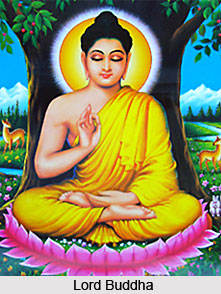 Transitoriness of the body is the second postulate of Spiritual Training or Sadhana. Dhammapada has said that death is that sublime truth which none can deny. But interestingly every being wants to avoid this universal truth. Lord Buddha had insisted that death carries off every one. In fact the messengers of death wait for individuals. Death may snatch away life anytime. He had said that there is nothing in this world to be attracted because all entities are in fact transient in nature. But the fools do not want to realise the reality and they run after the sensual and transitory pleasures. He believed that an aspirant of spiritual path must realise the transitoriness of the body along with the entire attractive phenomenon.
Transitoriness of the body is the second postulate of Spiritual Training or Sadhana. Dhammapada has said that death is that sublime truth which none can deny. But interestingly every being wants to avoid this universal truth. Lord Buddha had insisted that death carries off every one. In fact the messengers of death wait for individuals. Death may snatch away life anytime. He had said that there is nothing in this world to be attracted because all entities are in fact transient in nature. But the fools do not want to realise the reality and they run after the sensual and transitory pleasures. He believed that an aspirant of spiritual path must realise the transitoriness of the body along with the entire attractive phenomenon.
As Dhammapada discusses about the transitoriness of the body it has been said that more than anything death is the most certain in the life of every individual. Even if someone tries to escape from the clutches of death it is not possible. Thus when such is the case that none will be able to escape the clutches of death the best thing for the aspirant of the spiritual path would be to utilize death in a proper manner. It has been declared that as long as an individual is haunted by the fear of death he wants to run away from it. In fact if one is confident about the inevitability of death and is prepared to face it any moment, he won`t he wont be afraid of death. Moreover it can be said that when any one remembers death constantly his life would be pure and holy.
It can be said that concept of transitoriness of the body gives one the idea of vairagya or detachment which is a must for every kind of Sadhana. None can proceed on the path of spirituality as long he is not filled with the strong feeling of detachment. Buddha had said that when individuals are able to realise the transitoriness of the body and the sorrows of birth, death and old age only then he is able to proceed smoothly on the spiritual path.
It has been mentioned that when a wise man has cleansed his mind of all impurities and is free from all kinds of sin then gradually he enters the heavenly abode of the Noble. Moreover when an individual emancipates himself from all kinds of sins and acquires a pure mind then he is liberated from the cycles of birth and death. Rather it can be said that an individual is able to achieve Nirvana only with a pure heart.
It has been instructed in Dhammapada that one should look upon the world as a bubble, one should look upon it as a mirage and the individual who looks upon the world in such a manner, the king of Death does not see him. The declaration in this section of Dhammapada was that the wasted form (body) is a nest of diseases and is perishable. The body breaks to pieces and life indeed ends in death.
Lord Buddha in this section had said just as a cowherd with his staff drives his cows into the pasture even so do old age and death drive the lives of sentient beings into a new existence. Ultimately this part concludes saying that human body when reaches the old age loses its elegance. Most of its physical strength gets lost but the Dhamma or Virtue of good man does not ever decay. Hence the focus at this juncture is that it is the wisdom, the virtue and the ethics that stays with an individual for ever unlike his transient body and a wise man always gives more importance to the wisdom on the contrary a foolish man grows old with only flesh increasing in his body but his wisdom does not increase.




















